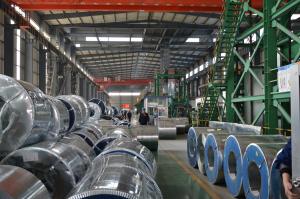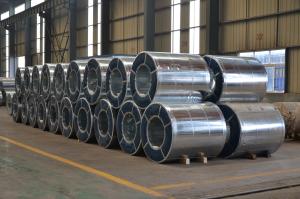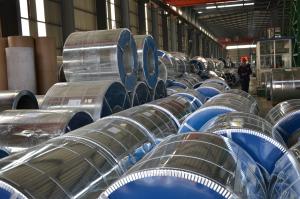galvanized steel coils
- Loading Port:
- China Main Port
- Payment Terms:
- TT OR LC
- Min Order Qty:
- -
- Supply Capability:
- -
OKorder Service Pledge
OKorder Financial Service
You Might Also Like
1) Quality Standard & Grade: JIS G3302, SGCC / ASTM 653M CQ/ EN10142 DX51D+Z
2) Thikness tolerance: +/-0.02mm Width tolerance:+/0.02mm
3) Zinc coating weight: 50g/m2
4) WEIGHT OF PER COIL: 3-5MT
5)Technology: cold rolled
6) Surface of Product: regular spangle / big spangle/ small spangle; Surface Treatment: chromated , non oiled, skin passed
7) Packing: export standard packing,packed with moisture resistant paper and metal
wrapping,securely tied for export,on metal skids7) Country of Origin :
SIZE:0.35*914
- Q:I just purchased this Benchmade knife with m390 steel blade and it cost me a fortune but I wanted to know if this new steel is a tool steel. what classifies a tool steel. M390 = 1.9 carbon, 20. chromium, .30 manganese, 1. molybdenum, .60silicon, .60 tugsten, 4. vanadium at 60-62 HRC
- Not all tool steels work well in knife blades, but some of them are very popular. D2, M2, M4 and many others.
- Q:Can steel coils be used in the production of agricultural equipment?
- Yes, steel coils can be used in the production of agricultural equipment. Steel is a commonly used material in the manufacturing of agricultural machinery such as tractors, plows, harvesters, and irrigation systems. Steel coils can be formed, cut, and shaped to create various components and structures required for these equipment. The strength, durability, and corrosion resistance of steel make it suitable for withstanding the harsh conditions and heavy workloads involved in agricultural operations.
- Q:How are steel coils inspected for thickness using ultrasonic testing?
- Steel coils can be inspected for thickness using ultrasonic testing, which is a non-destructive testing method. In this process, a handheld ultrasonic thickness gauge is used to measure the thickness of the steel coil. The ultrasonic thickness gauge emits high-frequency sound waves that travel through the steel coil. These sound waves bounce back from the backside of the coil, creating an echo. The time taken for the echo to return to the gauge is measured and used to calculate the thickness of the coil. The gauge consists of a transducer that emits the sound waves and a receiver that detects the echoes. The transducer is placed on the surface of the coil, and a coupling gel or oil is used to ensure a good acoustic contact between the transducer and the steel surface. The transducer emits a short burst of sound waves, which penetrates through the steel coil and reaches the backside. When the sound waves encounter any changes in the thickness of the coil, such as defects or variations, they get reflected back to the transducer. The receiver detects these echoes, and the time between the emission and reception of the sound waves is measured. Using the known speed of sound in steel, the time taken for the sound waves to travel through the coil and back can be converted into a thickness measurement. This provides an accurate assessment of the thickness of the steel coil at various points. Ultrasonic testing is a reliable and efficient method for inspecting the thickness of steel coils. It allows for quick measurements without damaging the material, making it suitable for quality control and ensuring compliance with manufacturing specifications.
- Q:please i need your help in answering this question manufacturing process of steel containers and 20 references
- There are many types of steel containers and many different mnfg processes. There are also thousands of different steel alloys. Steel is used for canned food, compressed air cyclinders, hydraulic pressure vessels, electrical boxes, and many other containers. Steel containers are made out of sheet metal by soldering, brazing, spot welding, seam welding, riveting, bolting, screwing, etc. Heavier wall containers are fabricated of plate steel. Some steel containers are made by deforming the steel by extruding, forging, spin forming, drawing, ironing, etc. Some steel containers are made by machining. You should be able to find plenty of references if you search for these terms. good luck
- Q:What are the different types of steel coil surface treatments for durability?
- There are several types of steel coil surface treatments used to enhance durability. These include hot-dip galvanizing, electro-galvanizing, galvannealing, and organic coating. Hot-dip galvanizing involves immersing the steel coil in a bath of molten zinc to create a protective zinc coating. Electro-galvanizing is a similar process, but it uses an electric current to deposit a layer of zinc onto the steel surface. Galvannealing combines the galvanizing and annealing processes to create a zinc-iron alloy coating that offers enhanced corrosion resistance. Organic coating involves applying a layer of paint or other organic material to the steel surface, providing protection against corrosion and enhancing aesthetics.
- Q:I have two theories, which one's correct?My book says that steel is made up of 98% iron and 2% carbon.98% of iron's molar mass (55.85 g/mol) is 54.733.2% of carbon's molar mass (12.01 g/mol) is .2402.If you add them up that gives you that steel has a molar mass of 54.97 g/mol.However, steel's chemical formula is Fe(3)CThat would make it's molar mass 179.56 g/mol.( Because 3(55.85) + 12.01 = 179.56 )Which one is correct?
- Molar Mass Steel
- Q:What are the dimensions of steel coils used in the appliance industry?
- The dimensions of steel coils used in the appliance industry can vary depending on the specific application and requirements. However, the most common dimensions for steel coils used in the appliance industry are typically around 0.015 to 0.035 inches (0.38 to 0.89 millimeters) in thickness, 24 to 36 inches (61 to 91 centimeters) in width, and weighing between 1,500 to 10,000 pounds (680 to 4,535 kilograms). These dimensions allow for efficient handling, transportation, and processing of the steel coils in the appliance manufacturing process. It is important to note that these dimensions can vary and should be confirmed with the specific manufacturer or supplier for accurate and up-to-date information.
- Q:In what ways can steel fail in use of buildings ad what can be done to prevent it?
- I am a secretary at a Steel panel making company! But I still can't help you. :(
- Q:Steel being my favorite type, I just picked up Heart Gold today, my gf got Soul Silver...I was wondering which steel types are available and somewhat easily obtainable in HG (and/or what is the earliest steel type I can get?)
- There aren't many Steel types in the Johto and Kanto regions. You'll have to rely on trading from Sinnoh and Hoenn to get most of the Steel types. In Soul Silver you can get a Skarmory on Rt 43, I believe. Ask your gf to catch you one when she gets there.
- Q:What is the role of steel coils in the supply chain?
- The supply chain heavily relies on steel coils, especially in the manufacturing and construction sectors. These coils, typically made from hot-rolled steel, are essential raw materials for a wide range of products like automobiles, appliances, construction materials, and industrial goods. The journey of steel coils in the supply chain begins with the production of raw steel, which is then processed and shaped into coils at steel mills. These coils are then transported to different manufacturing facilities where they are transformed into finished products. Throughout this process, steel coils act as an intermediary product that is easy to transport, stack, and manipulate according to various manufacturing requirements. One major advantage of using steel coils in the supply chain is their strength and durability. Steel possesses high tensile strength, enabling it to withstand substantial loads and pressures. This makes steel coils perfect for applications that require sturdy materials like structural components in buildings, heavy machinery, and vehicles. Furthermore, steel coils offer high customization, allowing manufacturers to tailor their dimensions and specifications to meet specific needs. This flexibility ensures the efficient delivery of steel coils that align with the requirements of diverse industries and projects. In terms of logistics, steel coils are typically transported in large quantities using specialized equipment such as flatbed trucks, railcars, or even ships. Effective logistics planning is crucial to ensure timely delivery and minimize transportation costs. Additionally, proper storage and handling are vital to prevent damage to the coils during transit and storage. Overall, steel coils play a vital role in the supply chain as versatile raw materials that can be shaped and transformed into various end products. Their strength, durability, and flexibility make them an essential component in industries that rely on high-quality steel, ultimately contributing to the overall economic growth and development of numerous sectors.
1. Manufacturer Overview |
|
|---|---|
| Location | |
| Year Established | |
| Annual Output Value | |
| Main Markets | |
| Company Certifications | |
2. Manufacturer Certificates |
|
|---|---|
| a) Certification Name | |
| Range | |
| Reference | |
| Validity Period | |
3. Manufacturer Capability |
|
|---|---|
| a)Trade Capacity | |
| Nearest Port | |
| Export Percentage | |
| No.of Employees in Trade Department | |
| Language Spoken: | |
| b)Factory Information | |
| Factory Size: | |
| No. of Production Lines | |
| Contract Manufacturing | |
| Product Price Range | |
Send your message to us
galvanized steel coils
- Loading Port:
- China Main Port
- Payment Terms:
- TT OR LC
- Min Order Qty:
- -
- Supply Capability:
- -
OKorder Service Pledge
OKorder Financial Service
Similar products
New products
Hot products
Related keywords





























